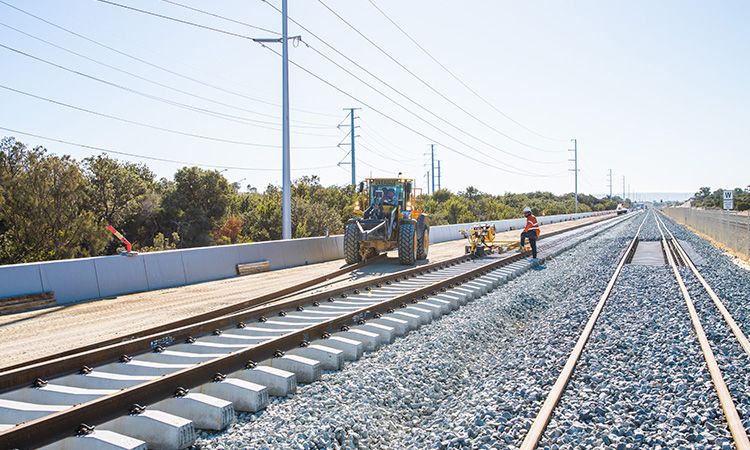Transforming waste into value: the Thornlie-Cockburn Link ballast reuse initiative
For the Thornlie-Cockburn Link project, the NEWest Alliance adopted an innovative approach to reuse ballast, transforming potential waste into valuable material for project infrastructure.
Instead of discarding ballast that no longer met specifications for new railways, the Alliance identified a sustainable opportunity to repurpose it as drainage blankets along the railway alignment. Ballast was recovered during two significant railway shutdowns: the Mandurah Line shutdown from Glen Iris Tunnel to Cockburn Station (December 2021–January 2022) and the ARC freight line shutdown (14-16 October 2023). Through these efforts, the Alliance collected approximately 10,920 tonnes of ballast from the Mandurah Line and around 67,000 tonnes from the ARC freight line.

Challenges and outcomes
The ballast from the Mandurah Line was transported offsite for screening by a local contractor to meet the required specification (>40mm) suitable for railway drainage blankets. Following screening, roughly 6,706 tonnes of ballast from the Mandurah Line was repurposed for drainage along the ARC rail alignment, while about 9,471 tonnes from the ARC freight line was used for drainage along the Thornlie-Cockburn Link and was screened onsite at Market City. Excess screened ballast from the Mandurah Line that did not meet size specifications was made available for additional applications, such as road base, supporting waste reduction goals by avoiding disposal.
Similarly, 52,039 tonnes of excess ballast from the ARC line were stockpiled in Mundijong for Main Roads Western Australia or supplied to the Armadale Line Upgrade Alliance for future drainage applications. Additionally, approximately 2,950 tonnes of screened ballast were listed on the Transport Portfolio’s ‘matX’ platform for potential reuse in other projects.
This ballast reuse initiative achieved multiple sustainability goals, with over 16,000 tonnes of ballast repurposed within the project. The benefits include:
- lowering emissions: achieved a substantial reduction in greenhouse gas emissions, with an estimated savings of 82.5 t CO2-e for the PTA line and 116.5 t CO2-e for the ARC line. Partnering with a local contractor further reduced emissions by minimising transportation impacts.
- preserving resources: reusing ballast material conserved valuable natural resources and eliminated the need for sourcing new raw materials.
- minimising waste: repurposing ballast for a secondary application significantly reduced waste generation, lowering the amount of material needing recycling or disposal in landfills.
- cutting costs: delivered considerable cost savings by repurposing ballast for the drainage blanket, avoiding the expense of purchasing virgin materials.
- leading innovation: by challenging conventional construction practices and sharing these best practices, the project fostered a cultural shift within the industry, inspiring others to adopt creative solutions for repurposing materials that might otherwise be discarded.
Awards and recognition
- Nomination finalist for the CCF Award 2023 – Sustainability Excellence Category
- Submission shortlisted for the Waste Sorted Awards 2023 – Innovation Category
Next steps
Building on the success of the ballast screening and reuse initiative for the PTA Mandurah line, NEWest expanded its efforts to explore similar opportunities for reusing ballast from the ARC freight railway. Comprehensive testing and investigations were conducted to evaluate the feasibility and methodology for reusing this material. For the ARC slew ballast, the team opted to screen the ballast onsite at the Market City stockpile, significantly reducing emissions by avoiding unnecessary transportation to and from a separate screening facility.
By fostering collaboration and driving innovative initiatives like this, the project aims to advance more sustainable construction methodologies. This effort demonstrates that even in large-scale infrastructure projects, teams can work together to promote a circular economy, turning environmental challenges into opportunities for progress.